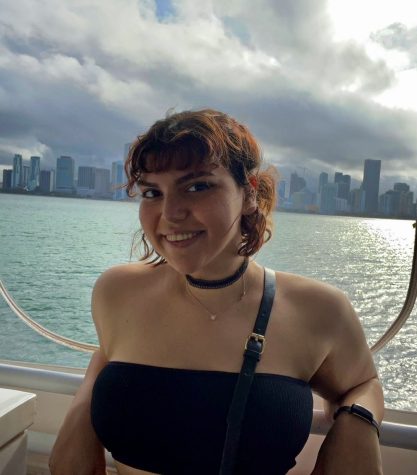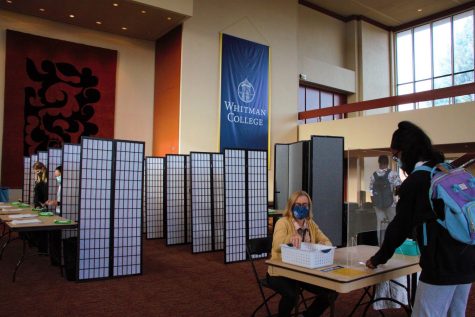Beyond the Bubble: Conflict at the border of Poland and Belarus and the president of Brazil facing accusations of homicide and genocide
December 2, 2021
The Polish and Belarusian border conflict
On Thursday, Nov. 18, border officials in Bruzhi, Belarus cleared the encampments of thousands of migrants trying to cross through the main entrance into Poland. The region had been informally labeled “the jungle” due to violence and freezing weather conditions.
After migrants attempted to push their way through the razor wire fencing, Polish authorities reacted with blasts from water cannons and tear gas. The site turned into a wasteland of garbage, fires and empty tents.
Hundreds of migrants were warehoused in a shelter close to Bruzhi, sparking fears of potential deportation. Many have been injured and at least eleven people have died in recent weeks. The Polish government has closed its side of the border completely. Journalists, doctors and aid workers are barred from entering.
Poland, a member of NATO and the European Union, has been protecting outspoken Russian-allied Belarusian opponents. EU officials called the conflict a “hybrid war” created by Aliaksandr R. Lukashenka, the authoritarian leader of Belarus. The bloc has also placed sanctions on Belarus.
Belarus is calling it a humanitarian crisis. The government is blaming Europe for refusing to follow international law and preventing people from applying for asylum.
“We are not talking about a humanitarian crisis, but a threat,” said Pawel Soloch, the head of Poland’s National Security Bureau.
European Union officials believe President Lukashenka and Russia orchestrated the migrant crisis at the border crossing to create turmoil for the EU.
After Lukashenka’s re-election, protests emerged around the country accusing Lukashenka of election tampering. Belarusian authorities crushed the opposition with force. The EU responded with sanctions, which Lukashenka wants lifted immediately.
In recent months, the Belarusian government has lifted travel restrictions, encouraging migrants to cross the border into EU territory. There are reports of Belarusian authorities taking migrants directly to the border and sometimes forcing them to cross. In some cases, authorities gave migrants wire cutters to cut their way through the sharp metal fencing.
Despite the risks, some migrants continue with attempts to cross over into Western Europe. Hundreds are returning back to Iraq, where the majority of the migrants in Belarus are coming from.
The president of Brazil faces accusations of homicide and genocide
Hours before the Brazilian congressional panel released their report accusing President Jair Bolsonaro of “crimes against humanity,” they decided to omit their conclusion that Bolsonaro was guilty of homicide and genocide.
After six long months of investigation, the panel released nearly 1,200 pages outlining Mr. Bolsonaro’s failure to protect Brazilians during the COVID-19 pandemic. The report, released on Oct. 20, attributes over half of the country’s 600,000 COVID-19-related deaths to Mr. Bolsonaro’s negligence.
“In spite of all the vaccines that were on offer, the federal government opted not to buy them, a decision that went against all of the scientific studies which demonstrated their safety and effectiveness, and against the advice of all of the epidemiologists,” the report reads. The federal government’s failure to acquire vaccines as soon as possible “ended up claiming the lives of thousands of Brazilians who would undoubtedly have made use of such vaccines.”
In addition to Bolsonaro, the report recommends that 69 others should face criminal charges, including three of Mr. Bolsonaro’s sons and former and current political officials.
From the onset of the pandemic, Bolsonaro encouraged mass gatherings and ignored the advice of medical professionals to wear masks. He referred to the virus as a “little flu.” The President wanted to strengthen Brazil’s economy and achieve herd immunity. Brazil is listed in the top three countries with the highest COVID-19 cases.
The report cites Bolsonaro’s encouragement to use drugs like hydroxychloroquine even after being deemed ineffective against the virus and potentially posing a risk of heart problems. His administration stalled the vaccine rollout by ignoring over 100 emails from Pfizer.
Bolsonaro’s accusation of genocide comes from the deaths of Indigenous people in the Amazon rainforest, who are especially vulnerable due to high rates of obesity, anemia and malnutrition. It can also take days for medical assistance to find these groups, who travel by boat with limited resources for optimal care.
Renan Calheiros, Brazilian senator and lead author of the report, said in an interview with the New York Times that “many of the deaths were preventable” and that he is “personally convinced that [Bolsonaro] is responsible for escalating the slaughter.”
“The responsibility [of COVID-19 deaths] belongs to many people,” Calheiros said to a crowd of reporters. “But this is mainly because of the president, this serial killer, who…clearly demonstrates he has no respect for Brazilians’ lives.”
In fear of limiting the report’s potential, the congressional panel decided to retract the recommended charges of genocide and homicide, which could be perceived as radical when the recommendations are considered by the attorney general.
Some politicians see the report as politically charged and lacking evidence to indict President Bolsonaro.
If Bolsonaro is charged, he will be suspended from office for 180 days while Brazil’s Supreme Court decides the outcome of his case. If the Court agrees with the report, Bolsonaro will be convicted and will be unable to run for presidency in the next eight years.






